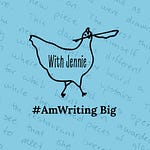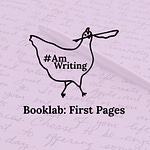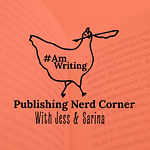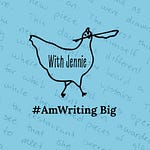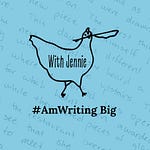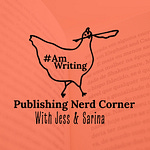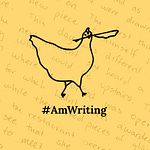Hi. 🙋♀️ My name is Sarina, and I’m a bit obsessive about stationery products. I’m always on the lookout for a good excuse to buy new pens or a new notebook. But bear with me, because this one is 100% valid: every year I buy a new reading journal, and I use it well.
The journal itself is nothing special. It’s just a 200 page B5 (or composition book sized) notebook where I keep track of all the books I’ve read. (Or, in many cases, books I started and did not finish. I’m a big DNFer, because life is short and there are too many books to cover.)
At the front of the journal I keep a list of the gems—the books I want to recommend. Plus a long list of things I want to read.
But 99% of the pages are given over to my thoughts about the books themselves. Sometimes I only write two lines, and sometimes I cover two pages.
When I first began tracking my reading like this, three years ago, I wasn’t very precise about what I wrote down. It was only after I formed a structure for my notes that the process became truly useful to me as a novelist. These days I always note some very specific things. Here they are, and here’s why they help:
1. Genre
After I note the title and the author, I write down the genre.
Okay—sue me—I actually have a cute set of self-inking stamps that flag the genre. A scary face for thrillers, a dinosaur for anything magical, and hearts for romance. But it would work just as well to write “thriller” at the top of the page.
Then, as I read, I make specific notes about the subgenre. Is it a domestic thriller with romantic elements? Is it a romance with a subplot of suspense?
We’re always told that our books have to fit in one specific spot on the shelf, or they’ll be unsellable. But the more you force yourself to notice, the more fluid genre appears to be.
Here’s an example: I love Karen Slaughter’s Girl Forgotten. It’s a procedural, because the main character is a US Marshall. But here’s the catch—it’s literally her first day on the job. So she doesn’t know what she’s doing. And there’s an element of the crime that’s deeply personal to her, which gives the book more of a domestic (girl with a problem vibe.)
Don’t let them put you in a box, at least not until it’s time to actually package the book.
2. Structure
Next, I make notes about the book’s structure. Is it single POV, or multi? Past tense? Present? First person or third? Do all the chapters take place in a linear timeline? And I write down which characters have POVs, as they occur.
The thing is, I’ve been reading novels for many decades now, and I thought I was well versed with all the possible structures. But by forcing myself to note them down, I see more about each book’s structure than I ever had before. And once in a while I learn some brand new tricks from a close analysis of structure.
Example: the psychological thriller Darling Rose Gold by Stephanie Wroblet has a really diabolical structure that kind of blew my mind.
3. Predictions
If I’m reading a book with elements of mystery or suspense, I always stop at 35% or 50% to write down how many suspects there are. Who am I meant to suspect?
And—crucially—I take a guess at the perpetrator or other secrets yet to be unveiled.
I've learned a surprising amount by doing this. For a mystery or thriller, there are usually 3 to 5 suspects. Once in a while, I come up on a book with so many more, like The Last Party by Clare Macintosh.
But what's really been interesting is how often I am correct about who the villain is! You’d think that my ability to guess the outcome would hamper my enjoyment of a book. If I'm able to guess the suspect halfway through, doesn't that mean the author failed?
Nope. The truth is actually the reverse—some of the books where I’d figured it out early turned out to be my favorites. And sometimes I’m right at 40% but the author changes my mind before I am finally vindicated. **Rubs hands together maniacally**
Bottom line—making guesses like this has helped me understand what readers of plot-driven books are really there for—to match wits with the author. Besides, a poorly executed twist is much worse than no twist at all.
4. Setting
I always write down the setting. And if I get through the book and have trouble remembering what city we were in, that’s telling, too.
5. Post-it for Quotes
Lately, I've been putting one 3 x 3 full stick post-it on each book’s page. Then I try to write a couple of chapter openers on that sticky note.
Personally, I find that opening a chapter is tricky for me, so I'd like to keep this top-of-mind as a way of observing how other people do it.
Sometimes I use the sticky note just for a particular turn of phrase that I enjoy, or some other bit of writing that I appreciate.
I guess the point of this exercise is to demystify great writing for myself. Sometimes the best writing is the simplest, and I could make myself crazy imagining that all effective writing sounds like Shakespeare.
6. Flaws
Usually, I write a no-holds-barred review in just a few sentences. It's worth, noting that nobody is ever going to see this book. It's for me and me alone so I don't have to save anyone's feelings when I write: "great setup; terrible execution." Or, "saggy in the middle. Couldn't stick the landing." “WHERE WAS HER EDITOR?”
Then again, the way to make this exercise truly useful is to write down what I might have done differently. At what point in the narrative should the author have taken a different turn?
If you can fix someone else’s book, you can learn to fix your own.
7. What’s the Point?
Finally, I try to jot down the book’s main point. This book is about trusting your community. This book is about the lengths women will go for bodily autonomy. This book asks how much we owe our families. Etc.
In conclusion
I promise you that I don't write down every single one of these things for every single book. Some books, frankly, aren’t worthy of such attention.
But when I manage to dig into a novel, in such a way that most of these questions are answerable? Those notes become invaluable to me. Writing them down makes the lesson stick. And by forcing myself to view novel from some of these frameworks, I have learned many valuable lessons about my own writing.
If the idea of being a book coach niggles at you every time you hear anything about our sponsor, Author Accelerator, I have good news: they’ve fully revised and updated both the fiction and non-fiction book coach certification program. With more than 100 hours of training, videos, case studies, and worksheets, Author Accelerator’s program teaches you the key editorial skills, client-management strategies, and tools needed to help writers reach their goals and to help you start a thriving book coaching business.
But maybe you’ve got no doubt it’s a great program—you’re just not sure if book coaching right for YOU, or if you can pull it off. Well, Author Accelerator wants it to be the right call for you, too. They’re offering a $99 5-day challenge all about getting your business idea out of your head and onto the page—but #AmWriting listeners get it for half off. Head to bookcoaches.com/podcast and enter the code PODCAST at checkout for 50% off. bookcoaches.com/podcast
And if you’re asking yourself—so why charge for the challenge, if they want it to be right for me too? Because if you pony up, you’ll really DO it. So if it’s time to stop dreaming and start acting, there you go.
I’ve been through this, and I can tell you that this is more than just an online course. You’ll take the skills you learn and apply them with real-life clients through three practicums designed to help you practice helping authors go from confusion to clarity with their novel idea. Yes, you work with real writers, yes it’s terribly nerve-wracking—but the author I worked with during one of my practicums just got a book deal with that project! This is real, kids—and it works.




